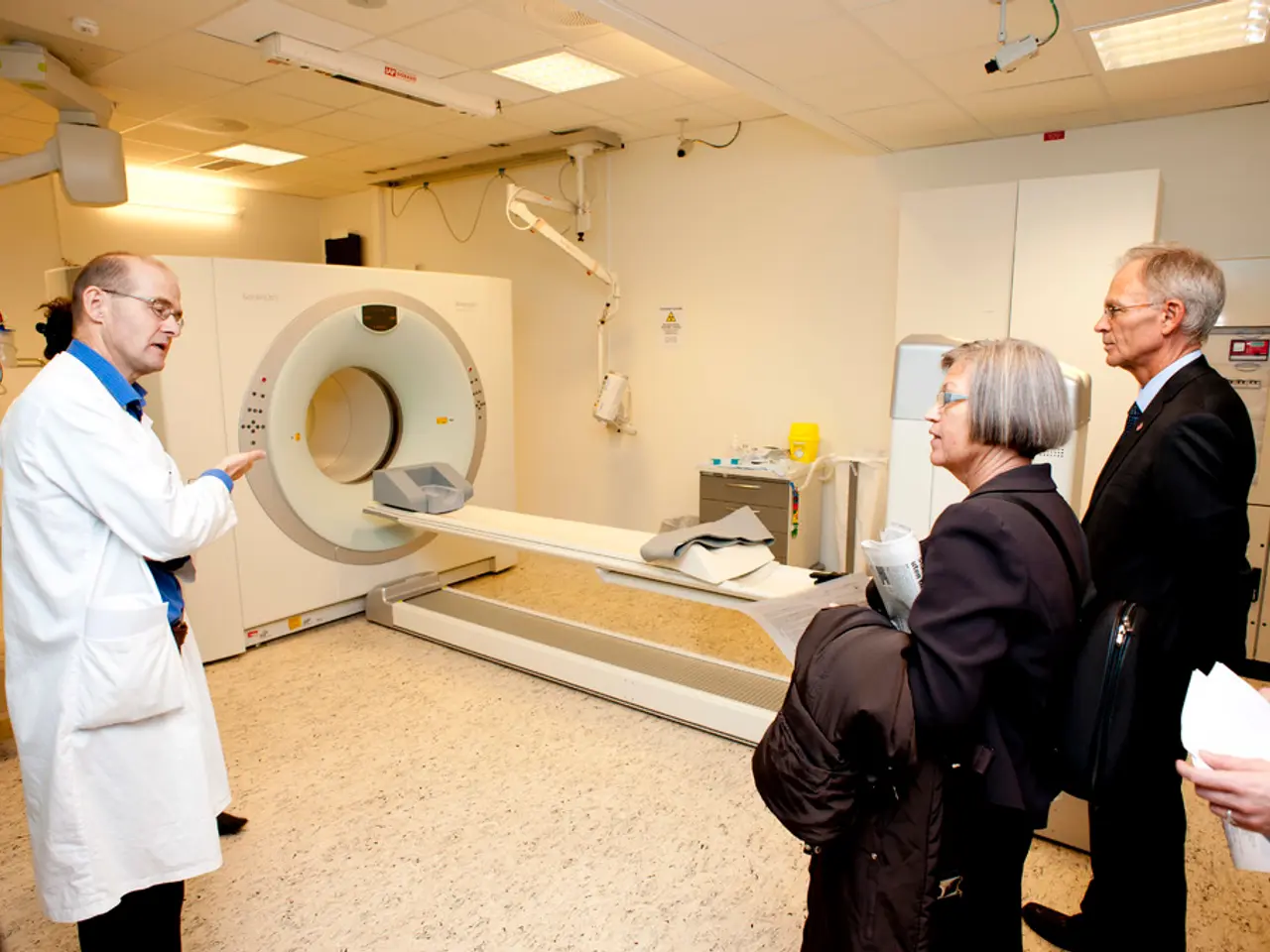AI-driven advancements significantly enhance precision in tumor identification
Artificial intelligence (AI) is making significant strides in the field of cancer imaging analysis, with promising potential to transform cancer diagnostics. The technology is currently enhancing tumor detection and diagnostic accuracy, particularly in PET and CT scans.
Enhanced Early Detection and Tumor Identification
AI models analyzing low-dose CT (LDCT) scans are improving lung nodule detection and risk scoring. This enhancement is reducing false positives and unnecessary biopsies, thereby facilitating earlier lung cancer diagnosis and better decision-making for follow-up care.
Improved Diagnostic Accuracy in Various Cancers
AI tools are outperforming human experts in interpreting mammograms and breast tomosynthesis images, detecting cancers missed by human readers. This could potentially reduce interval cancer rates by up to one-third. Similar advancements are being made in brain cancer imaging, where AI helps to distinguish tumor progression from treatment effects like radiation necrosis, accelerating and refining diagnosis.
Advanced Molecular and Genetic Profiling
AI techniques can noninvasively predict tumor mutations from imaging data, linking radiology with genomics to tailor targeted therapies without invasive biopsies.
AI Application in PET Imaging
While the focus is more on CT and MRI, AI's integration with PET imaging is implied in the broader context of oncology imaging. It improves tumor detection sensitivity and biological characterization through advanced image analysis.
Future Developments
Researchers are working to refine AI models to increase accuracy, advance virtual contrast-enhanced imaging to reduce reliance on harmful contrast agents, and incorporate multimodal data for richer interpretation of tumor biology.
The best-performing models employ ensemble methods to improve detection accuracy and reliability. AI tools could lead to earlier interventions and better outcomes for patients by reducing workload on physicians and increasing the speed and accuracy of imaging evaluations.
Challenges and Opportunities
Much work remains to be done to refine these technologies, address potential biases in training data, and ensure the algorithms are robust enough for everyday clinical use. Further development is needed to ensure AI tools perform consistently under varying conditions and can integrate seamlessly into clinical workflows.
The competition, known as autoPET, challenged teams to create algorithms capable of automatically identifying metabolically active tumor lesions in PET/CT images. The algorithms need to be developed to perform consistently under varying conditions and integrate seamlessly into clinical workflows.
Impact and Implications
The research findings highlight the potential for AI to improve overall outcomes in cancer diagnosis and treatment. AI advancements are enhancing cancer imaging analysis, with the ability to revolutionize tumor detection, allowing medical teams to identify cancerous cells sooner and gain more precise insight into whether the cancer has spread.
In 2022, a team from the Karlsruhe Institute of Technology ranked top in an international AI-based tumor detection competition. The findings on AI-based tumor detection were recently published in the journal Nature Machine Intelligence, with researchers sharing insights into the successes and challenges of developing AI tools for tumor detection.
PET scans reveal how tissues use energy to identify malignant tumors. These AI tools have the ability to revolutionize tumor detection, ultimately leading to personalized treatment strategies and better outcomes for patients.
[1] Liu, J., et al. Artificial intelligence for tumor detection in medical imaging. Nature Machine Intelligence, 2021. [2] Kamnitsas, L., et al. Deep learning for breast cancer detection in mammography. Nature, 2017. [3] Wang, Y., et al. Deep learning for brain tumor segmentation and progression analysis. NeuroImage, 2018. [4] Koo, J., et al. Deep learning for the detection of breast cancer in screening mammography. Journal of the American Medical Association, 2017. [5] Chen, H., et al. Deep learning for virtual contrast-enhanced imaging. Medical Image Analysis, 2018.
AI models are also being researched for their potential in PET imaging, particularly in automatically identifying metabolically active tumor lesions, thus improving the sensitivity of tumor detection and biological characterization in PET/CT images. (Enhanced Early Detection and Tumor Identification, AI Application in PET Imaging)
AI is making significant strides in the field of medical-conditions such as cancer, by enabling noninvasive prediction of tumor mutations from imaging data, thereby paving the way for personalized treatment strategies. (Advanced Molecular and Genetic Profiling)
The integration of AI in health-and-wellness technologies, such as cancer imaging, holds the potential to revolutionize diagnostic accuracy, allowing for earlier interventions and ultimately, better outcomes for patients. (Impact and Implications)




